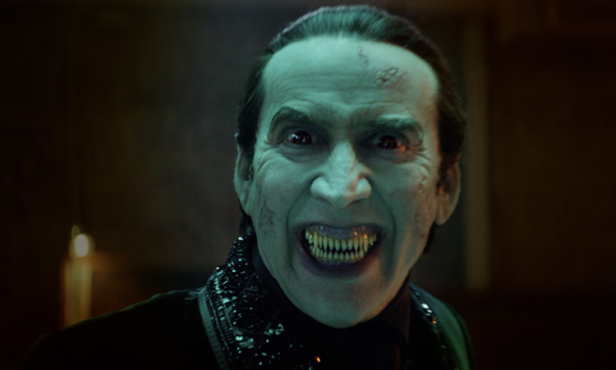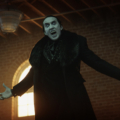It is absolutely no spoiler to say that the last two words of Chris McKay’s Renfield, said in voiceover, are “metaphorically speaking”.
The film’s narrator is also its protagonist, even if he is usually just a sidekick and a marginal player in the shadows of someone else’s story. For Robert Montague Renfield (Nicholas Hoult) is the long-serving minion and familiar of Dracula (Nicolas Cage, sinking his teeth into the rôle). Unaffected by daylight, Renfield seeks potential victims for his slumbering master among the pure and the innocent.
The Renfield of Bram Stoker’s 1897 novel Dracula enacts his master’s every malevolent whim in exchange for a regular supply of insects and the promise of immortality. Here, however, screenwriter Ryan Ridley (who has contributed to TV’s Community, Rick and Morty and Invincible), working from an original idea by Robert Kirkman (The Walking Dead), deviates considerably from the character’s depiction in Stoker: for Ridley makes Renfield a one-time real estate lawyer, as in Tod Browning’s and George Melford’s separate 1931 films of Dracula – and flashbacks to Renfield’s earlier adventures with Dracula are shown in flickering, distressed monochrome to suggest an archival print of Browning’s film.
As a further embellishment to Stoker, the consumption of bugs temporarily grants Renfield a portion of Dracula’s supernatural abilities, which approximate wire-fu superpowers; and Dracula’s own blood can heal the most grievous of Renfield’s, or anyone else’s, injuries, and even restore life to the dead.
Renfield’s narrative really does, as those final two words suggest, operate at a metaphorical level. For if its vehicle is a bunch of g(l)orified vampiric lore and action playing out in hilariously hyperbolic form, its tenor is the struggle, psychological and sometimes physical, to break free from a toxic partner and to rediscover life for oneself.
Renfield may, in frequenting a self-help group for those caught in dependent relationships, ostensibly be on the hunt for the oppressors of his fellow attendees to serve up as not altogether appetising morsels to Dracula, but he is also trying to get to the root of his own problems, and to rediscover himself through identification with similar sufferers.
And while Dracula may, like the metaphorical ‘monsters’ who torment Renfield’s new therapy group friends, be a controlling, manipulative, megalomaniac narcissist whose very voice has implanted itself in his partner’s head, he is also a more literal monster of the fanged, flying, Fledermaus variety, even if Renfield’s confrontation with him will involve therapeutic self-actualisation alongside bludgeoning combat.
Much of Renfield is concerned with ethical choices. When New Orleans beat cop Rebecca Quincy (Awkwafina) decides to face down mob enforcer Teddy Lobo (Ben Schwartz) and his formidable mother Ella (Shohreh Aghdashloo) rather than to acquiesce to their corrupting power, her example inspires Renfield to take his own stand against Dracula, even as the initially wavering Teddy decides, upon seeing Dracula’s awesome influence, to commit thoroughly to evil.
Everyone here is conflicted, apart from the straightforwardly, gleefully malicious Dracula and Ella Lobo (whose name translates roughly as ‘She Wolf’). So this monstrous morality play is realised with wickedly funny dialogue that fully embraces the premise’s absurdity, with ridiculously violent fight sequences where even severed limbs are weaponised, and with, well, a lot of psychobabble lifted straight from manuals of self-improvement and self-empowerment.
McKay also directed The Lego Batman Movie (2017), and Renfield’s madcap tone is similar if a lot bloodier in all its self-parodying humour, while also occupying narrative territories familiar from TV’s What We Do In The Shadows. Yet here it is Renfield who ultimately finds his voice, taking back control of his destiny and making Dracula’s story all his own – in a figurative sense, at least.
Renfield will be released in cinemas on 14 April. Find more reviews with SciFiNow.


